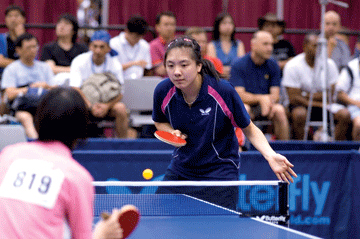
When it’s time to train, Penn’s student-athletes typically needn’t stray far from campus. Some make their way to the weight rooms in the Pottruck Health and Fitness Center, or to the Olympic-size pool downstairs. Others hit the Levy Tennis Pavilion. In good weather, there’s Bower Field.
Barbara Wei has to travel a bit farther.
Three or four times a week, the College freshman descends to the Market-Frankford subway line and crosses the Schuylkill River. After making her way to the Chinatown Friendship Gate at 10th and Arch streets, she ducks into the Eagle Hair Styling Salon, whose manager gives her a key. She then carries it across the street to a four-story office building whose timeworn facade doesn’t exactly inspire visions of callisthenic exertion. Its bilingual sign advertises the Asia America Group insurance company.
But her commute isn’t over just yet. Black ponytail bobbing, Wei crouches to the sidewalk to haul open a pair of heavy steel doors. Springing the padlock underneath, she creaks the rusted hinges of two more metal grates, spilling daylight down a dingy stairwell. Nailed above the doorway at the bottom is a bright yellow sign. Its hand-painted black letters spell the name of her destination: SOUTHERN PRAYING MANTIS.
In all of Philadelphia, you will not find a tougher game of ping pong than the ones that happen here.
Wei has been playing since she first picked up a paddle as a seven-year-old. In 1999 she won the under-12 singles title at the Junior Olympics. Three years later she nabbed the title in the under-14 division. After joining the U.S. Cadet National Team, Wei faced down (and befriended) the competition in tournaments as far flung as Southeast Asia and Brazil. For a time she was the second-best American under 18.
She likes her teammates on Penn’s table tennis team well enough, but none of them can quite keep up as a practice partner. Playing boys is fun, she allows—“They get really upset when they lose”—but the University doesn’t really have any that give her a true run for her money.
“She’s just a better player than me,” says College senior Eric Leventhal, the No. 2 player and vice president of Penn’s table tennis club. “She’s just faster. She’s got a better short game. Her backhand is incredible. If I give her an easy ball to her backhand, she just kills it, and the point’s over.”
Thus the trek to the Southern Praying Mantis club, where fluorescent lights buzz above two competition-grade tables and a camera tripod that some players use to make game tapes. It would be hard to imagine a more obscure sports setting. Relocking the steel doors one bright, crisp day in January, Wei was accosted by a well-dressed woman who demanded to know what she was doing. Wei told her and the woman frowned. “I don’t know anything about this,” she said. “And I am the owner of this building.”
For someone accustomed to the world-class facilities of the Maryland Table Tennis Center, a few miles from where Wei grew up, this dank, narrow basement is a long way from ideal. “I almost cried the first time I came,” she says. But if she is to make the leap from junior competition to the national stage, it will have to do.
The first major test of that desire came right before the start of the spring semester, when Drexel University hosted the 2008 U.S. Olympic and National Team Trials. Seeded at the bottom of the nine-player women’s field, Wei struggled unsuccessfully to close the gap separating her from the top of the bracket.
“That was really hard,” she says. The crowds were bigger than any she’d faced in the past, and she’d spent the previous few months substituting college coursework for coaching. “I want to say that if I wasn’t at Penn this semester, I would have done better.”
But the next weekend, at a smaller tournament, she regained her poise. “I beat people that I’d never thought about beating before—they had very high rankings,” she says. Those victories pushed her own national ranking, which had dropped consistently since her arrival at Penn, back in the right direction. Currently there are only about three dozen women in the country who would be favored to beat her.
The return of classes the following week shifted Wei’s priorities in a decidedly more academic direction—she’s considering a career in health-care policy—but she was also excited about the prospect of a summer study-abroad program in China, where table tennis is a national obsession. Since finishing 7th grade, Wei has spent six or eight weeks each summer training at East China Technological University, a global table-tennis powerhouse in Shanghai. This time she hopes to work as hard on improving her language skills as her forehand, but returning to the sport’s competitive epicenter will be more than just a fringe benefit.
“I kind of want to win a collegiate title,” she smiles. “And 2012 isn’t that far away.”
—T.P.

